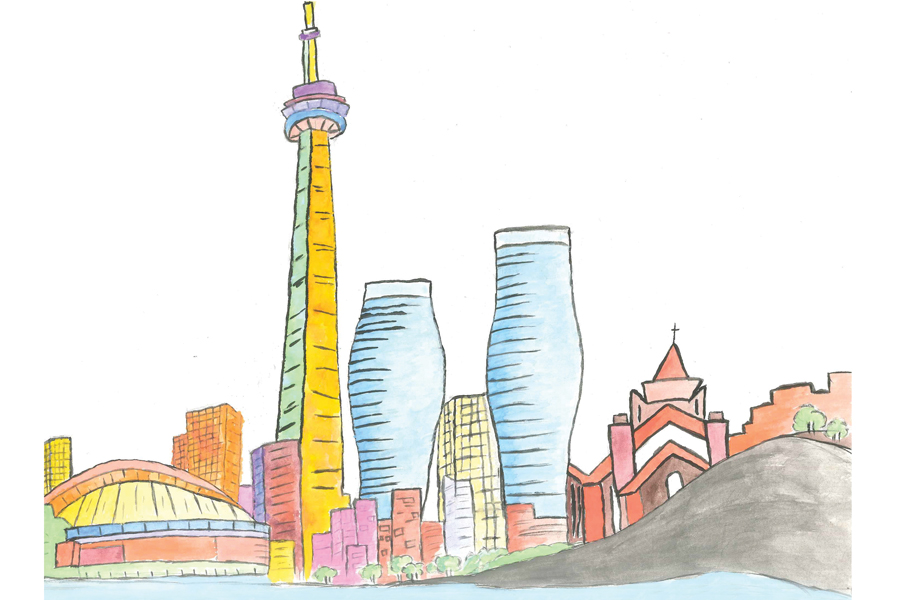For the past 20 years, home for me has been the suburb of Oakville, Ontario. Nestled between Burlington and Mississauga, it is where I made many of my first friends and had many of my first experiences, yet I always had a desire to go to Toronto: the city.
As a kid, driving into Toronto from the west on the Queen Elizabeth Way felt like entering the Emerald City. It was as if the CN Tower was the light guiding me to the place where I could be who I wanted to be.
Growing up, I heard kids from other areas surrounding Toronto — Whitby, Ajax, Brampton, Mississauga, and beyond — claim that they were from Toronto. At first, it seemed ridiculous. To Toronto natives, people who claim they are from Toronto and are not may seem like posers. Nevertheless, as I began to think about it, I realized that this declaration was more layered than it seemed.
As human beings, we always yearn for something that we don’t have. If we’re walking, we’d rather be riding a bike. If we’re riding our bike, we’d rather be in a car. If we’re in our car, we wish we could teleport. A similar state of mind is at work when suburban youth want to cut themselves off from where they are from in order to achieve something more. Seeking this self-improvement, they often look to places where they believe they can better find or shape their identities.
These places contain a combination of people and things that are new and innovative. They are exotic — they are where anyone who is anybody resides, where anything worth mentioning takes place. It does not matter if this is reality or not; what really matters is that there is a place to feel free from familial obligations and suburban angsts. In books and films, ‘the big city’ is a common trope. It acts as a cornucopia of promise and freedom. For young people living in the Greater Toronto Area, Toronto is that city.
Toronto is a symbol for people who do not feel part of traditional suburban culture. While the suburbs are built on uniformity, Toronto is built on individuality. If you are a kid who feels like you do not fit into the mould of suburbia, tired suburban scenes can feel like a prison keeping you from where you want to go.
If you relate to this, you probably feel that your identity is vastly different from your family’s reality. To them, a house in the suburbs is the pinnacle of familial success. It’s in a friendly neighborhood and has good schools, numerous public programs, and lots of open space. It’s the best place for them to raise children. But you are no longer a child, and leaving the suburbs to go to the city gives you space to find and reach your own pinnacle of success.
In the suburbs, there is often a disconnect between the people who surround you and the lifestyle you desire to have. There is never an interesting place or activity in your town — it’s all in the city.
For suburban kids, claiming Toronto as their own helps to divorce them from the connotations of their hometowns. In many cases, it is not that these people don’t love where they’re from, but instead, they do not want to be associated with the stereotypes attached to their towns, even though these are usually only exaggerations that fail to reflect the complexities of the places they label.
Having grown up in Oakville, I noticed that people outside my town would make comments about it, saying that everyone there was snobby and stuck-up. I was taken aback. I wasn’t like that, but I lived there. I grew to see that the stereotype wasn’t without merit, but it wasn’t how I wanted to be represented either.
These connotations can also enforce the idea that the suburbs are ‘less ethnic.’ As a person of colour, this idea adds another layer to the suburban stereotype. Saying you are from Oakville, London, or other certain towns may cause people to see you as ‘white-washed.’ Although the place where you grew up is a part of you, your desire to seem more a part of your ethnic culture is often stronger.
This desire spurs people to remove themselves from their hometowns and claim Toronto, a well-known cultural hotspot, as their own. It is problematic that society sees suburbia as synonymous with a lack of culture, but suburban kids can’t be blamed for not worrying about that. When they say, ‘I am from Toronto,’ it is because they have a strong desire to belong.
At the end of the day, there are many reasons why people claim they are from Toronto when they are not. These reasons may stem from a lack of personal and cultural representation in suburban communities. Perhaps hockey isn’t their sport, they have never played YMCA soccer, or they prefer artisan coffee shops to Starbucks. Regardless of the reason, Toronto becomes the place where a fragmented sense of belonging becomes whole.
